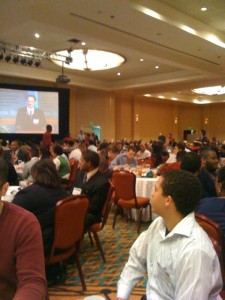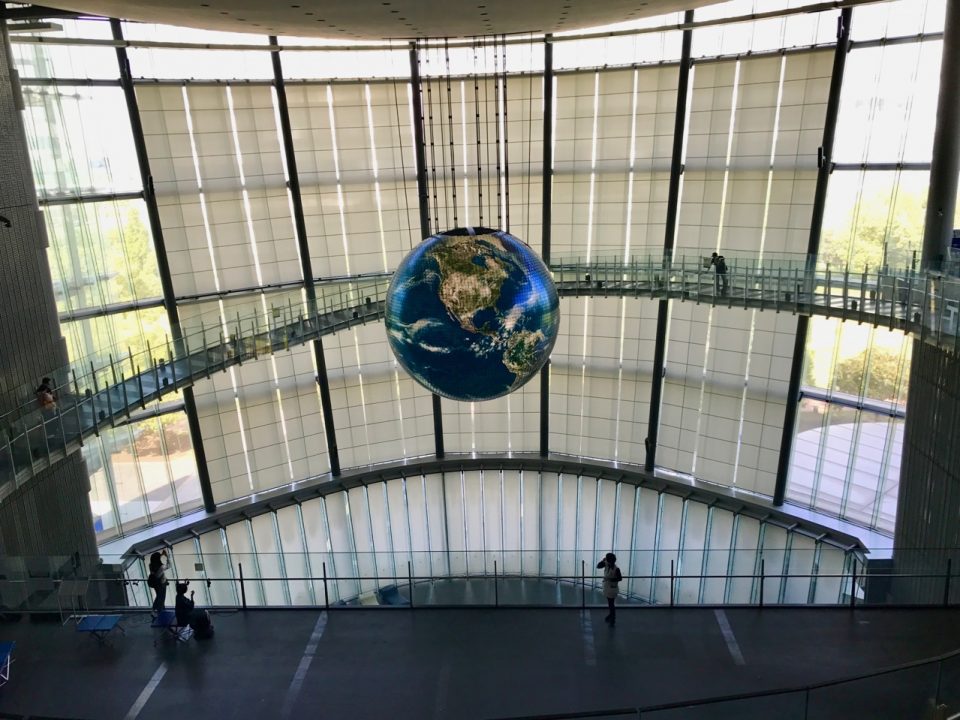Back from the Physics Diversity Submit 2009 conference in Nashville, TN
200 yrs ago Charles Darwin was born
February 13, 2009Talk at SETI today – Tomorrow at UC-Berkeley
February 18, 2009Dear readers,
I am flying back from Nashville, a large city in located Tennessee. This was my first stay in this southern state. I was invited to give a talk about my work on adaptive optics for the study of the solar system at the astronomy session of the Physics Diversity Summit and joint 2009 Annual Conference.
This conference was organized by the National Society of Black Physicists (NSBP) and National Society for Hispanic Professionals (NSHP link) and aims at giving to the students from under-representated groups the opportunity to meet, discuss, and get connections for future job while meeting their peers. I was extremely surprised, but also pleased, to be invited to give a talk at this conference. It is clear that the timing could not have been better after the recent election of the first African American president and my recent decision to be more involved in the effort of improving the diversity of our science community.
I worked for 8 years for the Center for Adaptive Optics (CfAO), an National Science Fundation NSF center dedicated to the development of Adaptive Optic technology. The center has developed various initiatives such as summer internship programs, classes in community colleges, internship for Hawaiian students, and so on. He really surprised me when I arrived in the US to see how seriously this lack of diversity in the group of scientists was taken seriously by federal agencies such as the NSF and NASA. In fact, in my home country, France, which has a significant immigrant population, it is impossible to even study this diversity since it is forbidden to provide questionnary asking for the ethnical background for instance.
There are therefore two completely opposite attitudes; on one hand, the French governement used the famous republican moto of “Egality” to consider that we are all equals and therefore the idea of “labeling” people by ethnicity is intolerable and forbidden. On the other hand, the USA has a more pragmatic attitude, the government or individual companies ordered statistical studies, which sometimes show that there is a lack of representation of minorities in various areas (including science) and then try to find a solution. I am pretty sure that if the French government was conducting the same studies they will find out that this problem exists in France as well.
For being myself, one member of these minorities, I was very reluctant when I arrived in the US about these studies, and even chocked the first time they asked me to fill my ethnical background. However, after seeing the initiaves and their successful impact with some of my under-graduate students (which are now in master or Ph.D), I think it is important to try to find a solution instead of occulting the problem.
The lack of diversity cannot be solved in few months; it is a painful and difficult task that needs to be coordinated and motivatedy from the top level of the executives in a company, a federal agency or a university. For instance, UC-Berkeley crated in 2007 a position of vice chancellor of equity and Inclusion to which Gibor Basri, a reputed astronomer, was appointed. I heard about similar initiatives while being at the diversity summit conference coming from private universities like Vanderbilt University located in Nashville.
So what kind of solutions can we propose? A system based on affirmative action has shown its limit, since it looks unfair for the majority. Specific programs conducted for all students, but specifically mentionning that those under-represented student are encouraged to apply may help but seems limited. One solution is to advertize an opportunity in area where these students meet, organizing a conference like this diversity summit. This conference also gives the opportunity to the students to see that they are not a singularity in an homogeneous group. It also gives them the opportunity to meet professors, postdocs or researchers like them. I want to emphasize that finding a mentor, a person who is a colleague but also a friend and who understand you and where you can from, is definitely the key to help a student or a young researcher to conduct his career successfully. Sometimes one just needs a bit of confidence to get away from the stereotypes that one had imposed to himself/herself.
Let’s face it, when I was a young student in France, I had the feeling that I was a singularity. I don’t remember to have had a non-causian professors, neither had the opportunity to discuss or meet with someone like me until my I finished my bachelor I had to fight against the stereotypes all along my career from professors, but also from other students. It is only during my master that I had the opportunity to meet wonderful professors at the Observatoire Midi-Pyrenees who motivated me and mentioned to me that wherever I come from, I can be a scientist, an engineer or even an astronomer. I am thankful to them and I hope I could have the same impact on my future students.
This was a very serious post that I wrote in the plane while coming back from the conference. I apologize in advance if it looks offensive to you. I am looking forward to reading your response and thoughts about this point. To light up the atmosphere, I am attaching a few pictures from Nashville, TN and the conference.
regards,
F.
Chers lecteurs,
Je me remets a ecrire quelques uns de mes posts en francais. Je vais tres certainement prendre le temps de traduire ceux que j’ai ecrit precedemment dans les prochains jours.
Je rentre de Nashville, une ville du Tennessee. C’est la premiere fois que j’ai l’occasion de me rendre dans cette etat du Sud des Etats-Unis. J’etais invite a donner un talk sur mes travaux en optique adaptative sur l’etude des astres du systeme solaire durant la session d’astronomie de la conference sur la diversite en physics.
Cette conference est organisee tous les ans par l’association nationale des physiciens noirs (NSBP) et l’association nationale des physiciens hispaniques (NSHP) dans le but de donner l’opprtunite aux etudiants de ses groupes peu representes dans les sciences de se rencontrer, discuter, prendre des contacts professionnels pour de futurs emplois tout en rencontrant leurs collegues. Je dois avouer que j’ai ete extremement surpris et aussi flatte d’avoir ete invite a cette conference. Le timing n’aurait pas pu etre meilleur considerant l’election du premier president noir aux Etats-Unis et ma decision prise en debut d’annees de m’impliquer davantage dans l’amelioration de la diversite dans la communaute scientifique.
J’ai travaille pendant 8 ans sous l’egide du CfAO, un centre scientifique et technique dont le but est de promouvoir le developpement de l’Optique Adaptative. Ce centre a aussi mis en place divers programmes, comme des stages d’ete, des cours dans les universites modestes, et des stages techniques pour la communaute Hawaienne. J’ai ete surpris de voir a mon arrivee aux USA comment le manque de diversite dans le corps scientifique est pris tres au serieux par des agences federales comme la NSF et la NASA. La France, qui compte une population d’immigrants tres importante, ne prend en aucun cas ce probleme en consideration. De fait, il est meme impossible de faire des etudes statistiques sur l’origine ethnique pour verifier s’il y a ou non une sous-representation de minorites, car elles sont purement et simplement interdites.
On voit donc qu’il existe deux attitudes completement opposees. D’un cote, le gouvernement francais utilise le fameux moto republicain d’Egalite pour considerer que nous sommes tous egaux et que donc toute tentative de comptage par ethnicite serait considere comme raciste et donc interdite. De l’autre, une attitude plus pragmatique aux US, pour laquelle le gouvernement, ou meme des entreprises, commandent des etudes sociologiques, incluant l’origine ethnique, qui pourrait montrer s’il y a un manque de representation des minorites. Je suis quasiment certains, et pour cela il n’y a qu’a allumer sa tele, qu’en France il y a un manque evident de visibilite des minorites dans tous les domaines, la communaute scientifique incluse.
Faisant moi-meme partie de ses minorites, j’etais tres peu enclin a remplir ce genre de formulaire quand ils m’etait presentes a mon arrivee au Etats-Unis. C’est seulement apres avoir compris qu’ils pouvaient mener a une consideration du probleme et que les initiatives prises pouvaient avoir un impact (il n’y a qu’avoir certains etudiants faisant partis d’un programme du CfAO qui sont maintenant en these) que j’ai commence a soutenir ce genre de questionnaire.
Le manque de diversite ne peut etre resolu en quelques mois; il doit etre pris en compte serieusement et aux plus hauts echelons de la societe, l’entreprise ou l’universite. UC-Berkeley a par exemple cree en 2007 un poste de vice-chancellor of equity and inclusion pour mener un combat clair sur ce theme. Gibor Basri, un astronome renomme, a ete embauche sur ce poste et apparemment ce genre d’initiatives commence a apparaitre meme dans les universites prives.
Quelles sont les solutions envisageables? Un systeme de type discrimination positive (affirmative action en anglais) a montre ses limites car il apporte plus de controverses que de resultats. Des programmes specifiques pour tous les etudiants, mais dans lequel on encourage les etudiants des minorites a postuler ont des resultats tres marginales car restent essentiellement emblematiques. Une solution plus evidente c’est d’attirer les etudiants des minorites en allant les chercher la ou ils se trouvent, comme par exemple dans des conferences organisees pour les minorites. Ce genre de conference peut aider les etudiants a se rencontrer, mais aussi a trouver un mentor. Un mentor n’est pas seulement un directeur de these ou de stage, c’est aussi un ami, une personne qui comprend d’ou l’etudiant vient et a peut etre la possibilite de partager son experience pour eviter a l’etudiant de faire les memes erreurs. Un mentor est important pour amener l’etudiant a etre plus confiant et surtout a sortir des prejuges qu’il/elle a entendu durant des annees de repetitions conscientes ou inconscientes lors de ses etudes.
Quand j’etais un jeune etudiant de maitrise, j’avais justement cette impression d’etre une singularite au sein d’un groupe homogene d’etudiants et de professeurs. Je ne me rappelle pas avoir eu un professeur de couleur par exemple, or meme d’avoir l’opportunite d’en rencontrer un/une. C’est seulement durant mon DEA (Master II) que j’ai eu un soutien net de professeurs a l’obervatoire Midi-Pyrenees qui m’ont clairement oriente vers l’astronomie et mon permis d’avoir confiance en moi. Je leur serai eternellement reconnaissant et j’espere un jour avoir le meme impact sur mes etudiants.
Voila donc un post plutot serieux ecrit en partie dans l’avion qui me ramenait de Nashville. J’attends avec impatience vos commentaires. J’ajoute quelques photos de Nashville prise durant la conference.
Cordialement,
Franck M.





1 Comment
A very important post – not offensive at all if you want my opinion. Back in France in December for a trip, I saw people’s reactions to see an African American presenting the news on TV. It was not quite racism but a surprise, something that the “average” person would not expect because it has never happened before. It is very interesting to imagine that the mind can let you think that your ethnical background influences your intelligence and ability to perform a task. Why would it ? That’s the all constant debate about nature and culture. Interesting to post such as topic right after a few words on Darwin as ironically the 2 are linked by the all long nature/culture debate. One’s ethnical background is natural – not a choice – and does not impact or should not impact one’s ability to become who one wants. I am glad people like you make the effort to fight for the next generations and not let your chance be an isolated one.
Bye now.